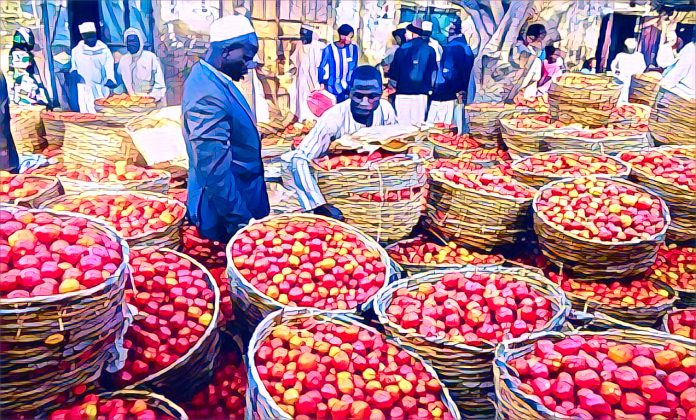In Bula, a community in Gombe State, Nigeria, selling tomatoes and peppers has turned into a booming business, making more than N12 million every day. This small but busy community in the Akko Local Government Area has become a major hub for these popular vegetables, sending them all over the country.
Malam Khalifa Bello, who leads the Vegetables Sellers Association in Bula, shared that the local agribusiness is not just about profits—it’s also about providing jobs. Many young people from the community and even from outside have found work thanks to this booming trade. “Since the harvest started, we’ve been shipping tomatoes and peppers worth millions of Naira to different parts of Nigeria daily,” Bello said.
Currently, around 700 baskets of tomatoes and 200 bags of various types of peppers leave Bula every day. This flow of produce is set to continue until December, bringing in even more money. Bello mentioned that during the peak of the harvest, which is expected in the next two weeks, the daily earnings from the market could skyrocket to more than N50 million.
Bello explained how prices have changed since the harvest began. Initially, a basket of tomatoes sold for between N25,000 and N30,000. Now, as more produce floods the market, the price has dropped to between N10,000 and N15,000, depending on the quality. Similarly, a bag of pepper that once sold for N80,000 is now going for N55,000 to N60,000.
The vegetables from Bula don’t just stay local. They are transported to many places across Nigeria, including Akure in Ondo State, Abuja, Nasarawa, Jos in Plateau, Kano, Adamawa, Yobe, and Borno. With the peak harvest season approaching, about 50 vehicles, packed full of these vegetables, leave the community every day.
Malam Mohammed, who heads the Laborer’s Association in Bula, highlighted the impact this business has on local employment. “We have about 75 young people working hard every day, from dawn till dusk,” Mohammed said. These laborers earn between N4,500 and N5,000 each day for their work, which includes transporting, packing, and loading the produce.
Despite the success, the community leaders see room for improvement. They are urging the Gombe State government to help build a modern market in Bula. “A better market facility would help organize and improve the sale of our vegetables and other crops,” said one of the community leaders.
Bula isn’t just about tomatoes and peppers. The community also grows a variety of crops, including maize, sorghum, millet, beans, sugarcane, and guava. The rich diversity in agriculture shows that Bula has become a vital player in Nigeria’s farming sector, supporting both local livelihoods and the nation’s food supply.



